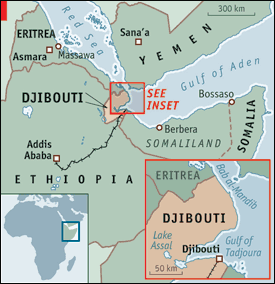 Fikirka Xorta ah
Fikirka Xorta ah - Well, to begin with Somaliland is in a political cross road. The only positive news is that the members of the Diaspora elite are going back to participate: the upcoming elections by declaring their candidacy, economic boom by investing huge needed capital along with new ideas, and by bringing their foreign born children to teach them about the culture.
On the other hand, the country is in one of the worst drought ever recorded. Average citizen is struggling to survive with less. There are no jobs. No humanitarian relief and support in sight or coming from outside world. Which made people uneasy about the future.
The Country is also in an election mood. Some of the politicians are gearing up to exploit their weak and frail constituents by; adopting clan tactics, bribes and empty promises.
Instead of waiting the rain season to make any big decision, however, the current government has, also, chosen to add more fuel to the fire by redistricting the land and creating more regions along clan and tribal allegiances.
This government action will have the potential to create more competition among clans. It will damage the peoples already fragile trust about their government. It is, or will be seen by future historians, one of the worst legacies the current administration would be leaving behind.
Such actions would clearly demonstrate the failed policies this administration has adopted lately. It emphasizes how Rayale, instead of providing services that ease the hardship of citizens’ daily lives; when they needed the most by coming up plans that craft more healing and unity, has chosen to utilize divisions and fear mongering way of ruling.
The 'clan Politics" is the most distractive force that has destroyed our brethren Somalis in Mogadishu. The Current Administration is playing with fire.
Off course, some would agree that there are areas that would benefit a separate administrative regions because of their population density and rapid growth of their cities such as Gabiley. But doubling the entire country's regions from 6 to 12 without years of study and a budget to hire new civil servants, buy equipments and dissect plans to manage these regions will eventually be confusing to an already devastated and traumatized nation.
A contributor to a Somali website that is usually critical to Somaliland's existence got it part write this week in his Ed/Op article titled, "Rayaale has got his sums wrong again". The article went further explaining the reasons why the government is wrong and the bad consequences that will follow. Click here to read the article:
http://www.somalipressreview.com/view.php?articleid=328The Somaliland Administration’s management style has focused lately in only one area: How to divide and rule clans? How to master the clan politics to further advance the current leadership’s quest to remain power? How to exploit the meager resources of the nation?
Local papers are reporting that some Somaliland Ministers are abusing the public offices by accepting bribes and making deals with foreign corrupt companies. Take a look at the Somaliland Times’ coverage and “detailed facts” about the actions of the Minister of Minerals and Natural Resources of Somaliland:
http://www.somalipressreview.com/view.php?articleid=328Contrary to what is happening inside Somaliland, the world has been looking at this poor nation a better keen eye that it has long deserved. There are 'highly visible' delegates coming from superpower nations. There are new voices added to the call for making Somaliland a member of the “international community”. US, mainly interested, of course, the port of Berbera, is leading the way. Even though The Somaliland government is tight lipped and refused to elaborate the nature of the deal it made with the US Government, sources close to the administration is painting a somewhat positive picture; the only encouraging report so far.
The outside world is watching and the reputation of Somaliland and the "credit" that it has built over the years as a transparent, democratic, and multiparty system above clan lines are in jeopardy, if not already damaged. The current Administration has created mess and every step forward it makes; unfortunately, it makes two backward steps with dire consequences.
It is time for change! We can no longer accept what is happening to the nation and the administration is loosing whatever little vision of leadership it has mastered in the past. To survive and move forward; New leadership! New blood! And new vision! Is what Somaliland needs.
Change is necessary, but, how could we make a smooth transition while preserving our peace and stability? Share your say with our readers.














